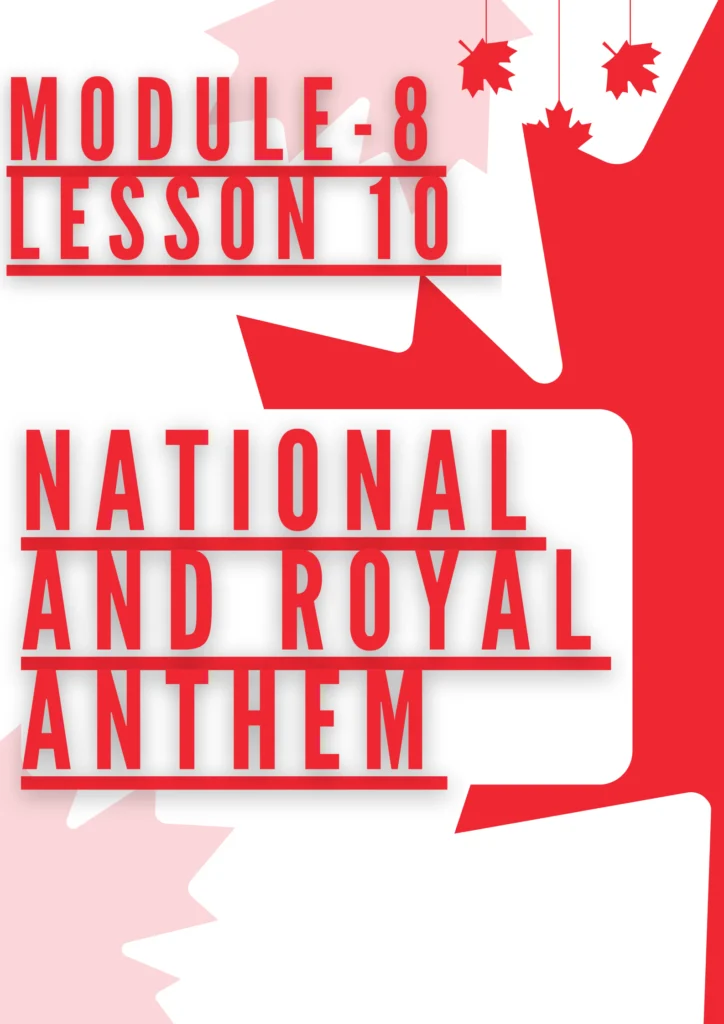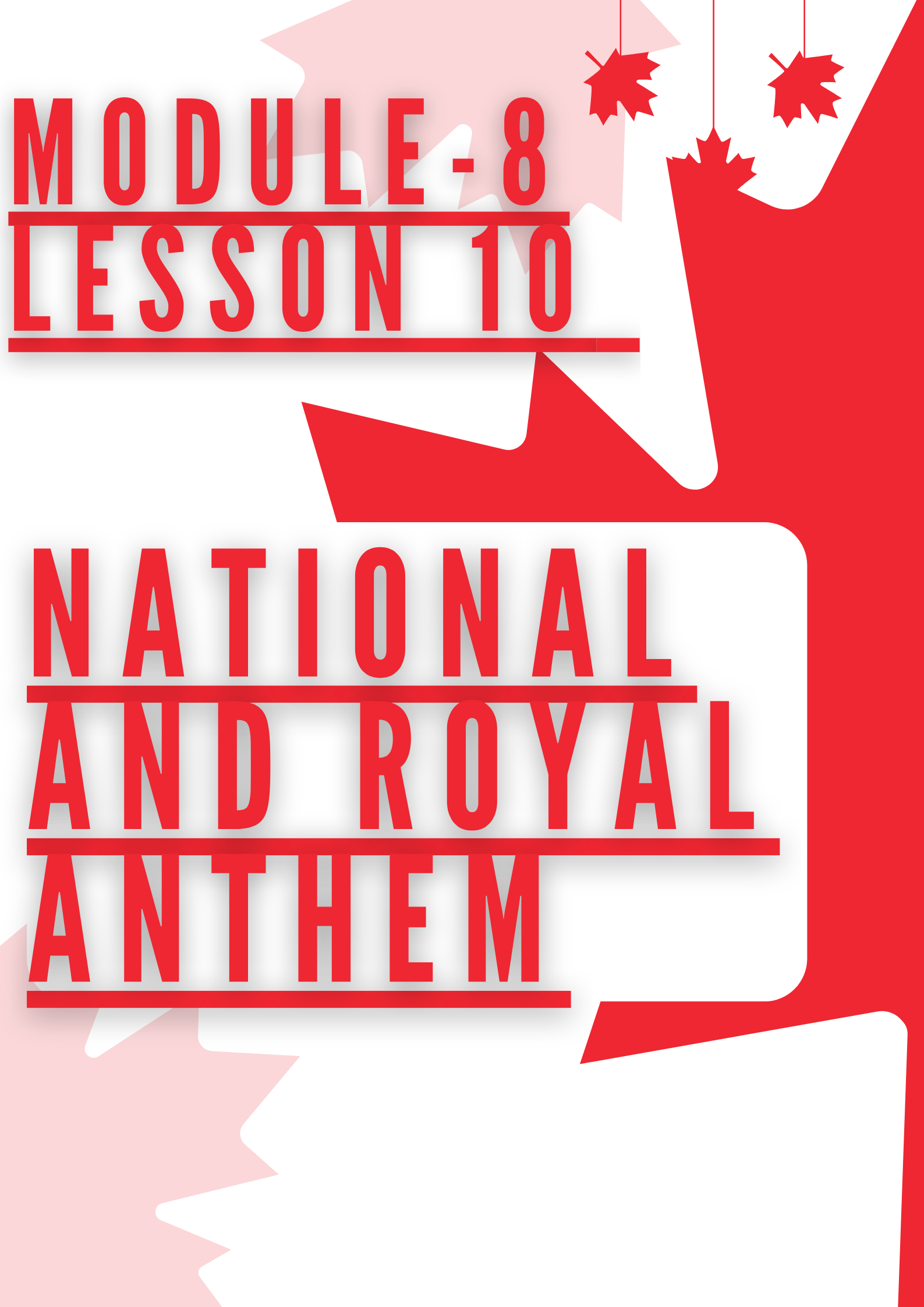Module-8 Lesson 10 National and Royal Anthem
The national anthem of Canada, “O Canada,” is a symbol for unity, pride and identity. The anthem has changed over time to reflect the rich culture and history of Canada, as well as its commitment to common values. Canada’s royal anthem is “God Save the Queen”, which highlights its constitution monarchy, and its ties with the British Crown. This exploration of Canada’s royal and national anthems explores their significance and history. We also examine the part they play in shaping Canada’s collective spirit.
“O Canada: The Evolution of a National Anthem”
It took several decades to create a Canadian national anthem. Although “O Canada”, now synonymous with Canadian Identity, was the result of many iterations.
Calixa Lavallee composed the original French music for “O Canada,” while Sir Adolphe Basile Routhier wrote the lyrics in 1880. The original song was written in 1880 to celebrate the Congres national des Canadiens Français, an annual gathering of French Canadians held in Quebec City. Versions in French and English are available.
Justice Robert Stanley Weir wrote the English version “O Canada”, which is now widely known, in 1908. By the beginning of the 20th century it became a popular anthem, often performed in official settings. It wasn’t till 1980, however, that the national anthem of Canada was officially established by an Act of Parliament.
In 2018, the anthem was given a final update, with gender-neutral lyrics. To reflect more inclusive language, the phrase “in thy all sons command” has been changed to “in us all command”.
“O Canada: Symbolism and Significance”
The song “O Canada” represents more than just a composition of music; it’s a strong expression of Canadian values and identity. This anthem is a powerful expression of Canada’s values, including freedom, unity, and diversity. The song celebrates Canada’s beauty in all its forms, including its landscapes that are “glorious” and “free” and the “true north, strong and free,” which define Canada’s geographical identity.
It is an anthem of great pride to Canadians. The song evokes a feeling of belonging and patriotism. The anthem is often played at international and national events as it represents Canada’s values. Sung in schools, at sporting events or during celebrations of Canada’s independence, the song “O Canada”, which is sung to open major sporting and national events, unites Canadians.
“God Save The Queen: the Royal Anthem”
The country recognizes that “God Save the Queen”, as well as “O Canada,” is its national anthem. This anthem dates back to 18th-century origins and is associated with British monarchy. Written by an anonymous author, the lyrics have been modified over the years. The anthem was sung in honor of the current monarch.
The history of “God Save the queen” is tied to Canada’s colonial heritage. In 1867 when Canada became a dominion under the British Empire, it adopted “God Save the Queen”. Canada, even after it became independent with the patriation in 1982 of its Constitution, maintained the constitutional monarchy. It also continued to recognise the royal anthem.
It is usually performed at formal or ceremonial events, particularly when the monarch and members of his family are present, as well as the Governor-General of Canada who represents Queen Elizabeth II in Canada. Although it’s not heard as often as “O Canada,” the anthem “God Save the Queen,” holds an important place in Canada’s ceremonial and constitutional traditions.
The diversity of Canada is reflected in the bilingual and bicultural anthem.
Both “God Save the Queen”, and “O Canada”, reflect Canada’s status as a constitutionally monarchy, with an incredibly rich mix of French colonial history and British. Canada’s bilingualism and multiculturalism is reflected in both its official languages as well as the national anthems.
It is an acknowledgement of Canada’s commitment towards linguistic diversity that both the English and French versions “O Canada” are recognized. It is usually sung both in English and French, which highlights the importance of inclusivity.
This bilingualism of the anthem is most evident at national ceremonies and events, when both English and French lyrics are often performed. The bilingualism of the anthem is an indication that Canada has a strong commitment to unity, and to celebrating its multi-cultural heritage.
Performance and ceremonial significance
Performances of “O Canada”, “God Save the Queen”, and other official songs have a significant symbolic weight. They add a touch of grandeur to events. The performance of “O Canada”, at major sporting events and official ceremonies as well as national celebrations, is a common occurrence. With their references to Canada’s values and landscapes, the anthem’s words set an atmosphere of unity and pride.
God Save the Queen is the anthem of choice for occasions that involve the monarchy. When the Queen, or members of her family, are in attendance, the anthem plays to emphasize Canada’s continuing allegiance towards the British crown. It is a sign of respect for the monarchy and acknowledgement of Canada’s constitutional links with the British Crown.
Cultural Impact of Anthems on Canadian Society
It is not just formal events and ceremonies that are affected by “O Canada”. These anthems form an important part of Canadian society. They are taught in school, they’re sung in public, and they remain in Canadians collective memory. Morning routines in schools across Canada often feature the song “O Canada”, which helps to foster a feeling of pride for Canada.
The performance of “O Canada”, a Canadian national anthem, is a staple at cultural and sports events such as the Olympic Games. It resonates both with Canadians, and viewers around the world. Inclusion of the anthem in different settings shows its versatility as an expression of national identity.
The anthems also inspire artistic adaptations and interpretations. The anthem “O Canada” has been interpreted in a variety of ways by musicians, choirs and artists of all genres. These renditions reflect Canada’s diverse culture.

Conclusion
Canada and God Save the Queen are not just musical compositions but living symbols of Canada’s diversity and history. “O Canada,” a song that reflects the commitment of Canada to multiculturalism and linguistic inclusion, is a call for unity. God Save the Queen, on the other hand, represents Canada’s constitutional ties with the British Crown, acknowledging historic legacies and its traditions.
With their long histories and ever-changing interpretations, these anthems continue to be a key part of shaping Canadian identity. The anthems are touchstones that remind Canadians about their heritage and shared values as they navigate social change and adopt new perspectives. Sung in schools, during international events or at moments of reflection “O Canada” & “God Save the Queen”, stand out as symbols that represent Canada’s history, its present and collective aspirations.






